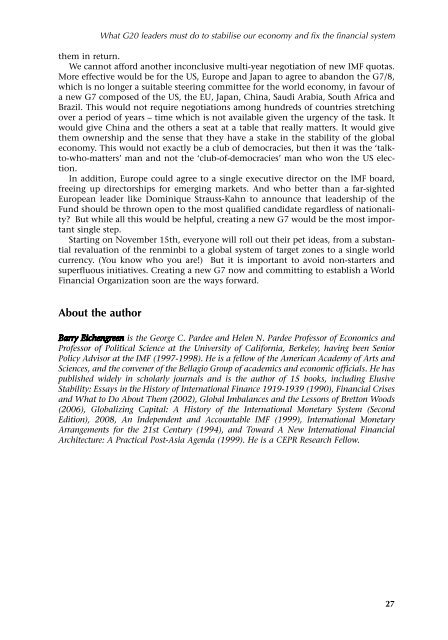What G20 Leaders Must Do To Stabilise our Economy and Fix ... - Vox
What G20 Leaders Must Do To Stabilise our Economy and Fix ... - Vox
What G20 Leaders Must Do To Stabilise our Economy and Fix ... - Vox
Create successful ePaper yourself
Turn your PDF publications into a flip-book with our unique Google optimized e-Paper software.
<strong>What</strong> <strong>G20</strong> leaders must do to stabilise <strong>our</strong> economy <strong>and</strong> fix the financial systemthem in return.We cannot afford another inconclusive multi-year negotiation of new IMF quotas.More effective would be for the US, Europe <strong>and</strong> Japan to agree to ab<strong>and</strong>on the G7/8,which is no longer a suitable steering committee for the world economy, in fav<strong>our</strong> ofa new G7 composed of the US, the EU, Japan, China, Saudi Arabia, South Africa <strong>and</strong>Brazil. This would not require negotiations among hundreds of countries stretchingover a period of years – time which is not available given the urgency of the task. Itwould give China <strong>and</strong> the others a seat at a table that really matters. It would givethem ownership <strong>and</strong> the sense that they have a stake in the stability of the globaleconomy. This would not exactly be a club of democracies, but then it was the ‘talkto-who-matters’man <strong>and</strong> not the ‘club-of-democracies’ man who won the US election.In addition, Europe could agree to a single executive director on the IMF board,freeing up directorships for emerging markets. And who better than a far-sightedEuropean leader like <strong>Do</strong>minique Strauss-Kahn to announce that leadership of theFund should be thrown open to the most qualified c<strong>and</strong>idate regardless of nationality?But while all this would be helpful, creating a new G7 would be the most importantsingle step.Starting on November 15th, everyone will roll out their pet ideas, from a substantialrevaluation of the renminbi to a global system of target zones to a single worldcurrency. (You know who you are!) But it is important to avoid non-starters <strong>and</strong>superfluous initiatives. Creating a new G7 now <strong>and</strong> committing to establish a WorldFinancial Organization soon are the ways forward.About the authorBarry Eichengreen is the George C. Pardee <strong>and</strong> Helen N. Pardee Professor of Economics <strong>and</strong>Professor of Political Science at the University of California, Berkeley, having been SeniorPolicy Advisor at the IMF (1997-1998). He is a fellow of the American Academy of Arts <strong>and</strong>Sciences, <strong>and</strong> the convener of the Bellagio Group of academics <strong>and</strong> economic officials. He haspublished widely in scholarly j<strong>our</strong>nals <strong>and</strong> is the author of 15 books, including ElusiveStability: Essays in the History of International Finance 1919-1939 (1990), Financial Crises<strong>and</strong> <strong>What</strong> to <strong>Do</strong> About Them (2002), Global Imbalances <strong>and</strong> the Lessons of Bretton Woods(2006), Globalizing Capital: A History of the International Monetary System (SecondEdition), 2008, An Independent <strong>and</strong> Accountable IMF (1999), International MonetaryArrangements for the 21st Century (1994), <strong>and</strong> <strong>To</strong>ward A New International FinancialArchitecture: A Practical Post-Asia Agenda (1999). He is a CEPR Research Fellow.27














